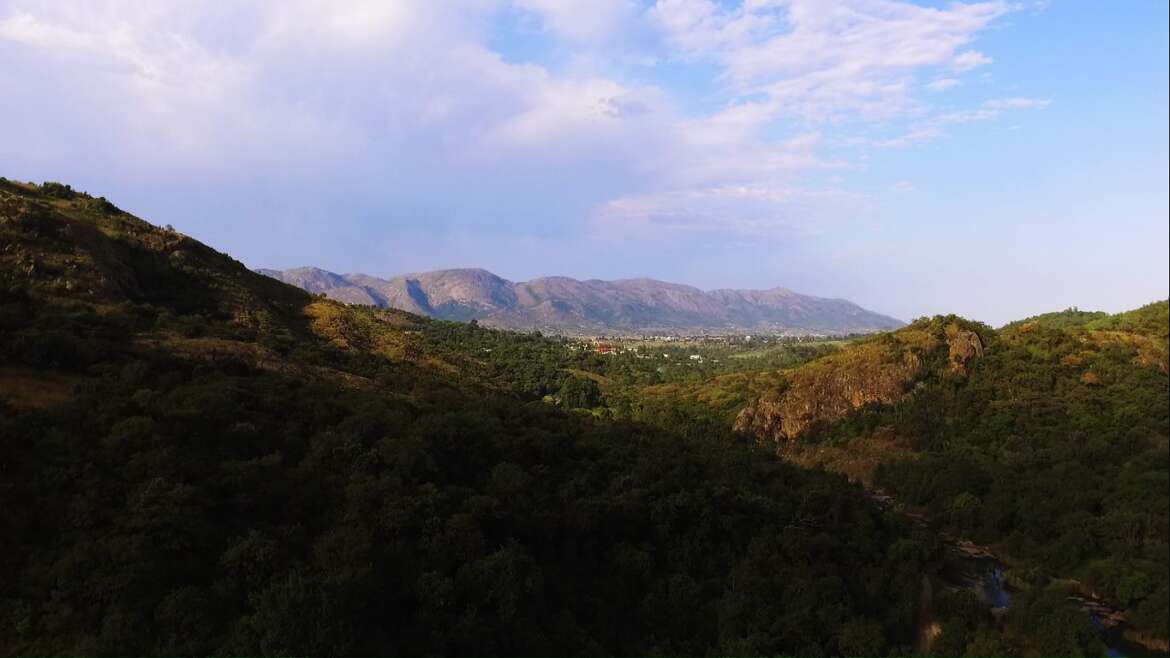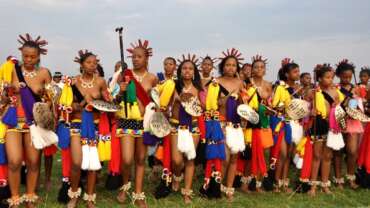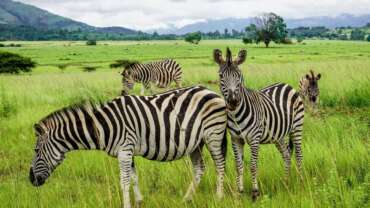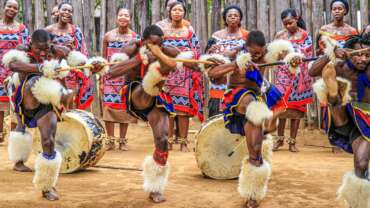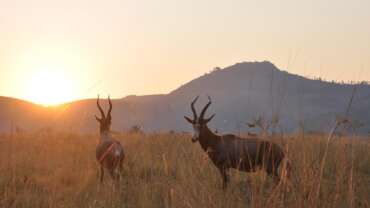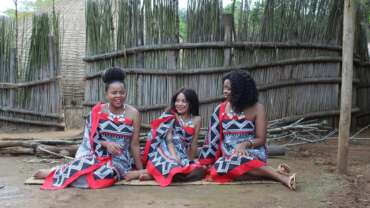Experiences in Eswatini (Swaziland)
Culture
Eswatini has some of the best Cultural Experiences in Africa
A tiny country with a big heart and warm, friendly people aptly describes Eswatini (Swaziland) – a country that is one of the few remaining monarchies in Africa and embraces and upholds its own unique and ancient traditions. Both the monarchy and the people of Eswatini actively maintain and preserve a remarkable cultural heritage that is probably unmatched anywhere in Africa. Visitors can get a better idea of traditional African culture here than pretty much anywhere else in the region, and what is seen, including spectacular festivals, has not simply been resuscitated for the tourist dollar but is the real deal. The famous Umhlanga (Reed Dance) and Incwala are traditional ceremonies that involve tens of thousands of Swazi people, and attract visitors from all over the world. But traditional attire, ceremonies and dancing are to be found throughout the country at all times of the year.
The Swazi people are proud and extremely friendly people. They welcome visitors with a beaming smile and take pleasure in showing off their beautiful country. As well as a number of community-run tourism initiatives, visitors are able to experience daily life in Eswatini by calling in at a local homestead or village, where they will be made very welcome. Alternatively, Mantenga Cultural Village is an excellent working reconstruction of a traditional homestead from around the 1850s, which gives an experience of all the complexities and nuances of traditional Swati life; as well as a quite tremendous dancing display by a group that tours the world.
Around the country, a series of well presented and fascinating museums and historical sites help tell the story of the country past and present and are well worth a visit.
The skills and creativity of Eswatini’s artisans is widely recognised and a wide range of arts and crafts are produced around the country. Most are socially-responsible ventures, providing employment to local communities, and also creating top level products exported around the world. Visitors can view the artisans in action and, increasingly, there are opportunities to even have a go themselves. Alternatively, there is plenty to choose from for those who prefer simply to go shopping!
Cultural experiences in Eswatini don’t have to end when the sun sets and there is plenty of nightlife to be found. As well as the casinos for which the country built a reputation when gambling was banned in South Africa, there are plenty of opportunities to enjoy the country’s thriving local music scene, not least at the unique House on Fire venue.
Wildlife
Experience the ‘Big 5’ in the little country of Eswatini
Eswatini’s (Swaziland’s) rich variety of landscapes and habitats gives it a profusion of fauna and flora, with the sheer number of species mind-boggling by most European standards. The country is not large enough to offer lots of big game experiences, but it has some 17 protected areas that are home to a very wide range of species, including the sought-after ‘Big 5’. As well as being one of the best places on the continent for rhino experiences (tracking on foot as well as viewing by 4×4, and to see both black and white rhinos), Eswatini is also the perfect place to get to grips with many smaller creatures often overlooked elsewhere. This is a country with a wealth and variety of safari experiences on offer.
Eswatini is also a paradise for birdwatching, with some 500 species of bird recorded in the country. That puts it roughly on a par with France (517) or, more locally, the Kruger National Park (505), and is a remarkable tally for such a tiny, landlocked country.
Thanks to its varied landscapes and wilderness areas, Eswatini’s flora includes over 3500 indigenous species of plants, with about 25 species endemic to Eswatini.
For traditional African big game viewing, Hlane Royal National Park and Mkhaya Game Reserve are the best places in Eswatini. Both are home to a variety of big mammals, including elephant, hippo, giraffe, zebra and rhino. Mkhaya is one of the best places on the continent to see both black and white rhino and Hlane is also home to everyone’s favourite big cat – the lion. Numerous antelope and smaller mammals are also found in both places.
Mlilwane Wildlife Sanctuary has a similarly diverse offering of fauna, though without the biggest of the animals except for hippos. This is a great place for the family and offers much in the way of activity from horse riding, mountain biking, to hikes and treks.
Scenery
Eswatini has a incredibly diverse terrain with breathtaking views
With the exception of desert and sea, every geographical feature of Africa’s terrain is found within Eswatini (Swaziland). This is a country of magnificent mountain scenery with rivers, waterfalls and gorges; unique rock formations which are among the world’s most ancient; lush and fertile valleys, plus typical African bush. From west to east, Eswatini moves from mountainous Highveld, through Middleveld to Lowveld, and then rises again to the Lubombo mountains. Altitudes vary from 21m to 1800m (70ft to 6000 ft) – yet the country’s east and west borders are less than 200 km (125 miles) apart.
The highveld is a land of hills, waterfalls and great buttresses of ancient rock – providing the country’s most dramatic and impressive landscapes. A temperate climate means some rainfall all year round and regular mists in summer, so the scenery is generally reasonably lush. The middleveld is generally less striking – an area of undulating bush and moist savannah lying at an average 700m above sea level. It is home to the bulk of Eswatini’s population and the tourist hub of the Ezulwini Valley. The lowveld is hot, bush country sitting as low as 21m above sea level. Although much drier than the other areas, it is home to vast, heavily irrigated sugar estates which are impressive in their own right. The remaining tracts of wild bush here harbour Eswatini’s major game reserves and offer easy access to areas of genuine wilderness.
With such a remarkable and varied ‘natural playground’, there is a wide choice of activities available in Eswatini for visitors to explore and enjoy the scenic landscapes. Hiking trials can be found all around the country but particularly in the highlands and mountains, and there are two championship-standard 18-hole golf courses in scenic settings and a smattering of 9-hole course around the country. For those who prefer to remain seated, both cycling and horse riding offer alternative ways to explore a variety of locations, at levels from beginners upwards, and there is even a chance to go quad biking through areas of wilderness.
The country’s mountains and gorges also provide opportunities for climbing and abseiling as well as a thrilling tree-top canopy tour of zip-wires, bridges and platforms in the Malolotja Nature Reserve. And from the highest peaks, to underground, Eswatini is home to the only major granite cave system in southern Africa, which can be explored even by visitors with no prior experience of caving.
When it comes to water, boat trips are available on a few of Eswatini’s dams, and the Great Usuthu River offers thrilling white water rafting, whilst fishing is possible on a number of the dams and rivers.
Adventure
The perfect African destination for the thrill seeker and adventurous traveller
Eswatini (Swaziland), otherwise known as ‘Africa in a nutshell’, is equally equipped for the thrill seeker as it for the safari lover or culture enthusiast. The variety and range of activities available in this small country is truly remarkable. From getting up close and personal with wildlife and leisurely hikes through a pristine wilderness, to high-speed journeys down river or gorge – there is so much to keep all visitors fully occupied! With nowhere more than 2 hours away from the country’s central tourism hub, activities can be enjoyed with ease and visitors are able to pack in as much, or as little adventure as they wish.
With wildlife sanctuaries and nature reserves dotted around the country, and home to the famed ‘Big 5’, Eswatini is a wonderful safari destination. And the opportunity to horse ride, cycle and walk alongside wildlife in some reserves gives and added element of adventure
The country’s highlands and mountains offer a wide choice of hiking opportunities, including through areas of genuine, un-touched wilderness. Those and other areas can also be explored through cycling and horse riding, with quad biking another option
For the even more adventurous, Malolotja Nature Reserve is home to a thrilling tree-top canopy tour of zip-wires, bridges and platforms, and various mountains and gorges also provide opportunities for climbing and abseiling. Moving underground, local adventure operator, Swazi Trails has pioneered adventure caving in southern Africa’s only major granite cave system. And to top everything off, perhaps the ultimate adventure comes from white water rafting on the Great Usuthu River. Another Eswatini-based operator, All Out Africa has the tagline “adventures that change lives” and offers a variety of volunteer projects and activity tours.
Sports
From championship golf courses, to fishing in the dams
Sports such as squash, tennis, swimming are available in Eswatini (Swaziland) at hotels and lodges as well as the Country Clubs on the Sugar Estates. Football is played throughout the country and international matches are held at the Somhlolo National Stadium in Lobamba. Rugby is less widely played but growing in popularity thanks largely to a charity, SKRUM, that uses the game help educate and develop the country’s youth.
Royal Swazi Spa in the Ezulwini Valley and Nkonyeni Golf Estate to the south are home to the country’s best golf courses, both with 18 hole championship courses and scenic views for the golfer to take in as they travel the course. Fishing is also available at a number of dams and rivers around the country, with trout, tiger fish and a number of native species to be found.
Volunteer
Numerous NGOs work in Eswatini (Swaziland) to help the most vulnerable in society – helping people to help themselves rather than simply providing handouts. The HIV/AIDS epidemic has resulted in orphans and vulnerable children now accounting for an estimated 15% of the country’s population. There are many ways for visitors to become actively involved during their trip as a volunteer, to help the people of Eswatini or work on environmental projects to help conserve the natural world.
All Out Africa is an Eswatini organisation well well known for their volunteer projects across southern Africa, offering a variety of social volunteer projects and sports volunteer projects that make a real difference to local communities as well as conservation volunteer projects in Eswatini and on the Mozambique coast.
All Out have social projects operating in Eswatini, Mozambique and in South Africa (Cape Town). These social projects work with vulnerable children to promote an early childhood education which they believe is the foundation for alleviating poverty in rural areas. Eswatini is in a biodiversity hotspot, in the top 2% globally. This is why All Out’s conservation projects in Mbuluzi Game Reserve are so important for conservation efforts that are implemented world wide. Their Savannah Research centre (SRC) focuses on population growth encroaching on indigenous savannahs and how this effects animal behaviour. A few species of bats and beetles new to the scientific community have been identified at the SRC and each year it hosts hundreds of students from all over the world who join to study biodiversity and ecology. All Out also have a Marine Research Centre in Mozambique which focuses on sustainable marine tourism conservation. The 2 research centres have together have had work published in over 60 publications.
Additional opportunities for sports volunteer projects are available particularly through the organisation SKRUM, which uses rugby to help with the education and personal development of young people around the country.
Alongside being a volunteer with organisations, there are a number of Community Tourism projects across Eswatini that were established by seed funds from the European Commission and Eswatini Government, but are now maintained by community members. Communities are empowered through the development process to assume responsibility for sustainability. Eswatini is proud of its many community projects that give visitors to the country an opportunity to have unique experiences such as exploring the peoples and customs of the bushveld and savannah or wondering at the great rock buttresses of the Sibebe and the Lubombo Mountains, among much, much more. Supporting these projects as a visitor or guest is valuable ‘hand up’ in itself, but within these projects, there are also opportunities for volunteers to get involved and make a real difference to their success.
Even visitors not taking a ‘hands-on’ approach as a volunteer can feel assured that the country’s tourist industry actively supports both local communities and wildlife & environmental conservation projects, so the ‘tourism dollar’ is one well spent in Eswatini.
Canopy Tours
Malolotja Nature Reserve is home to Eswatini’s first and only Tree Top Canopy Tour: the Malolotja Canopy Tour. This is located in the Sihlotswane Gorge, where one 50m suspension bridge and 11 wooden platforms have been ingeniously affixed to the steep sides. Participants descend the gorge by zip-lining down on a steel cable from platform to platform high above over the forest canopy and Majolomba river. Some lines are more than 300m long. The canopy tour offers views of towering cliff faces and the tree tops across the forest. Safety is paramount, and the system has been built to the highest civil engineering standards. Guides are trained professionals and this breath taking experience can be enjoyed by people of all ages.
Horse Riding
Exploring on horseback offers perhaps even greater freedom than on foot or on a bike and views always seem to be more spectacular when seen from the back of a horse! Eswatini offers visitors the opportunity to discover the beautiful country along a number of horse riding trails and, again, duration can be anything form a couple of hours to a number of days, depending on experience and ability. The main stables all have good facilities and cater to all levels they are found at: Mlilwane (Chubeka Trails), Ezulwini Valley (Hoofbeat Safaris), Mhlambanyatsi (Foresters Arms Hotel), Hawane Resort, Malkerns (Nyanza Stables).
Mountain Bike Races
Eswatini has developed as a worldwide attraction for the avid cyclist, both amateur and pro, as the country hosts a variety of mountain bike races. The annual IMVELO Classic is the biggest and most popular biking event, and takes place each June in Mlilwane Wildlife Sanctuary.
Eswatini has a number of mountain biking events through the year, including INYATSI Swazi Frontier and Imevelo MTB Classic. Inyatsi Swazi Frontier mountain bike stage race takes place every October. Riders team up in pairs and tackle 3 days of riding the unmarked route using GPS navigation devices. The route is a journey and riders stay in different accommodation venues each night. Find out more here.
The Imvelo MTB Classic is an annual event held every June ran by Big Game Parks at Mlilwane Wildlife Sanctuary. It comprises of a series of races over different distances, the longest being 64km. Find out more here. Other mountain biking events include the Ngwenya Glass Mountain Bike Challenge, held annually at the Ngwenya Glass Factory. The challenge has three different Routes to take part in – the 70km Marathon, 40km Classic and 27km Family Ride.
Cycling
Another great way to explore Eswatini’s stunning landscapes is by mountain bike. As with walking and trekking, the most adventurous can set out on their own across the country. However, there are popular, specific mountain bike trails in a number of locations, including Mhlambanyatsi, Hawane, Hlane, Malolotja, Mbuluzi and Shewula. Popular cycling excursions include cycling safaris at Mlilwane Wildlife Sanctuary, where all the family at ride around the grounds at their own leisure and discover the local wildlife. Eswatini is also home to collection of Mountain Bike races and challenges that take place throughout the Swazi calendar.
Hiking
The Nature Reserves in Ewatini are well known for their excellent range of self-guided hiking trails, offering the opportunity to visitors to experience nature at a pace suited to their group. What better way to explore Eswatini’s many and varied highlands, forests, and reserves than on foot. There are paths and trails in many locations across the country allowing for hikes from a couple of hours to many days in duration, and give access to places and views that are inaccessible by vehicle. Alternatively, those with initiative and a good map or GPS can simply head off into countryside.
If you are interested in taking a hiking tour, or exploring the country’s stunning landscape on foot, Eswatini has a number of local operators who can assist. Vaya Trails and Dust and Boots are specialist hiking tour operators whilst All Out Africa is an adventure operator that works with a team of 25 experienced local hiking guides, assistant guides and porters throughout Eswatini, offering day to multi day trips, with accommodation or camping options available for a range of fitness levels and group sizes. Their guides lead treks for families, couples and schools expeditions so are able to adapt to the needs and experience of a range of hikers.
Safaris
Eswatini is a Big 5 destination, with lions and elephants in Hlane Royal National Park, and both black and white rhino in both Hlane and Mhkaya Game Reserve. Game drives are very rewarding, but there are also opportunities to safari on horseback, mountain bike or on foot, if you want to get up close and personal. This even applies to the rhino, which can be tracked on foot – one of the most thrilling safari experiences there is. But, in Eswatini it’s not all about being big, with some rare species of smaller flora and fauna to be discovered. As for the bird-watching, the variety of species found across Eswatini’s varied habitats matches that of the much larger Kruger Park just to the country’s north.
Eswatini is home to numerous of Africa’s wild animal species with some 132 species of mammal recorded, many protected in the Game Parks and Nature Reserves found across the country. High on the wish-list of most visitors are such ‘charismatic megafauna’ as rhinos, giraffes, hippos and elephants – and you can certainly see many of these in Eswatini, alongside a small number of predators, and numerous antelope and smaller mammals and reptiles.
The emphasis in Eswatini is to provide visitors with a more intimate wildlife experience in areas of natural beauty, and to allow them a certain amount of freedom to explore on their own terms. In a number of the reserves visitors are free to move around independently, without the need for a guide or ranger. There are even self catering options amongst the accommodation that allow you to be in charge of your own ‘safari lodge’ in the bush. There aren’t many places in the world where you can head off for your own bike ride and encounter zebra and bushbuck along the way, or take a stroll to see the giraffe before settling down to your own bush barbecue.
For traditional African big game viewing, Hlane Royal National Park and Mhkaya Game Reserve are the best places in Eswatini. Both are home to a variety of big mammals, including hippo, giraffe, zebra and rhino. Mkhaya is one of the best places on the continent to see both black and white rhino and Hlane is also home to elephants and everyone’s favourite big cat – the lion. Numerous antelope and smaller mammals are also found in both places. Mlilwane Wildlife Sanctuary has a similarly diverse offering of fauna, though without the biggest of the animals except for hippos.
The Eswatini National Trust Commission reserves of Mlawula and Malolotja and the privately run Mbuluzi are also generally without major predators and the largest of the mammals, although Mbuluzi has giraffe and Malolotja the magnificent eland, and all three have the usual diversity of antelope and smaller mammals.
Caving
Those who want to get beneath the surface of Eswatini (Swaziland) – literally – could try this innovative activity run by Swazi Trails. It explores a unique cave system formed by the Kophola River that flows underground between Msunduza and Kophola Mountains, just off the Malagwane Hill between Mbabane and the Ezulwini Valley. There is an 800m course of subterranean passages some 90m below ground. This is the only major granite cave system known in Southern Africa, and comprises a series of water-eroded chambers with names such as Key Hole, French Connection and (for Harry Potter fans) Platform Nine and Three-Quarters’. Progress is slow and strenuous – with belly crawls, body jams and fluttering bats – but no experience is necessary. Participants must be reasonably fit, aged 8–65, and able to fit through narrow passageways. All necessary equipment is provided and trained guides accompany the two-hour course course.
Climbing & Abseiling
Eswatini’s highlands, mountains and gorges offer opportunities to both climb and descend a number of rock faces. Most popular sights include Sibebe Rock, north of Mbabane, where the three-billion-year-old volcanic slab offers a challenge to climb the ‘face’ of Sibebe Rock. A daunting prospect to even pro climbers. Alternative easier routes are available, with the possibility of a simple hike too. Execution Rock, a dramatic peak that was once the location of public executions in past times, is a popular attraction. It’s rocky surroundings is a great area for climbing, and the latest trend, bouldering.
Abseiling, although less popular, is offering by Swazi Trails, a local tour operator that specialises in adventure and adrenaline fuelled activities in Eswatini. Although not strictly climbing or abseiling, the zip-lining Malolotja Canopy Tour may be of interest for those that like being attached to a rope!
Quad Biking
Eswatini has a handful of quad biking opportunities for tourists to try. From hour-long dedicated quad bike trails to half day explorations, there are some high quality experiences on offer in which you can explore woodlands and nature reserves and muddy tracks that you may avoid on foot. Quad bikes, and trails are available with Swazi Trails in the Ezulwini Valley, at Hawane Resort and the Nkonyeni Golf Estate.
White Water Rafting
White Water Rafting trips are run by Swazi Trails on the Bulungapoort section of the Usutu River, between Sidvokodvo and Siphofaneni, in the centre of Eswatini. This is a remote and inspiring stretch of river. Its brown waters thunder through clefts and gorges, alternating with calmer stretches of bush and grazing land. You can expect fine views of rural Eswatini, with imposing rock formations, riverbank community life and a fair amount of wildlife. For most of the year this is generally a Grade III (medium difficulty) rafting river. In peak flow, however, it rises to Grade IV, and even has Grade V and VI sections, which the rafting trips avoid. As the trips use two-person inflatable rafts, with no guide on board, there is more to do than when simply floating downstream on a ten-man raft, where you need only hold on. That said, it is perfectly suited to first-timers, especially during the May–October low water season.
Birdwatching
Some 500 species of bird have been recorded in Eswatini (Swaziland). This puts it roughly on a par with France (517) or, more locally, the Kruger National Park (505), and is a remarkable tally for such a tiny, landlocked country. According to the Southern African Birdfinder, 21% of the 150 most sought after Southern African birds can be found in the country. These high numbers come from its diversity of habitats, with several very different bird communities occurring side-by-side. For sheer number of species, the lowveld is the richest region, with Hlane or Mlawula easily offering up to 100 species in a day to a keen birder – especially during summer, when all the migrants are around. You can also find the highest density of nesting white back vultures in Africa in the Hlane Royal National Park. The highveld has fewer species but is home to many rarities that are more elusive elsewhere. Malolotja is one of the top birding destinations in southern Africa.
Eswatini is home to 52 southern African endemics and is one of the only breeding sites for the blue swallow, one of Africa’s rarest breeding birds. Other A-listers for keen birders include the narina trogon, southern bald ibis, pink-throated twinspot and crowned eagle. For non-birders the most popular is the purple-crested turaco – the royal national emblem (ligwalagwala) and very pretty.
The best birdwatching is to be had in the protected reserves, sanctuaries and national parks, where the natural habitats are better preserved. But, of course, the birds are not confined to reserves and can be seen throughout the country. Hotspots & highlights include the following:
Malolotja: Highveld specials: blue swallow, southern bald ibis, malachite sunbird, gurney’s sugarbird, ground woodpecker, crowned eagle.
Phophonyane: Middlveld and forest birds: narina trogon, African wood owl, red-breasted sparrowhawk, crowned eagle, pink-throated twinspot, Eastern nicator.
Hlane: Lowveld birds and raptors: white-backed vulture, marabou stork, bateleur eagle.
Mbuluzi: Lowveld birds and waterbirds: white-backed vulture, bateleur eagle, African finfoot.
Mlawula: Lowveld birds and Lubombo specials: vultures, raptors, waterbirds, African Broadbill.
Mkhaya: Lowveld birds: crested guineafowl, narina trogon, purple-crested turaco, pink-throated twinspot.
Mahamba Gorge: Highveld specials: Southern bald ibis, Verreaux’s eagle.
Mlilwane: Middleveld birds and waterbirds: Verreaux’s eagle, purple-crested turaco, white-fronted bee-eater, waterbirds.
Nisela: Broad selection of lowveld birds and waterbirds.
Shopping
Every visitor to Eswatini should at very least do a little shopping before they leave. With various craft outlets, there’s something for everyone. The Ezulwini Valley in particular offers a wealth of options for that quintessential Swazi gift. At the Ezulwini Craft Market – Eswatini’s largest, with some 126 different stalls – you will find everything from wooden carvings, plates and beadwork to jewellery, textiles and traditional garments. The Mantenga Craft and Lifestyle Centre nearby offers similar fare, plus an opportunity to nip round the back and watch the artists in action. African Queen, an upmarket gift shop set in the Royal Swazi complex, stocks local crafts, including pottery and jewellery, plus an excellent selection of books. Gables provides standard ‘mall shops’. Swazi Candles Complex has debatably the largest collection of candles you will find in Africa! Along side the candle shop, there are other craft and boutique stalls for you to browse.
Arts & Crafts
Eswatini (Swaziland) has a remarkably impressive range of traditional arts and crafts with many of its products now found in top homeware stores and trendy ethnic boutiques around world. Throughout the country men and women are at work creating the finest handicrafts that are so popular with visitors. Creative basket ware in vibrant colours, wood and stone carvings, glassware, exquisite candles, batik items, jewellery – all uniquely Swazi.
As well as the opportunity to go shopping for these wonderful items, in many places that they are on sale, there is also chance to see the craftspeople at work and marvel at their intricate skills, and an increasing number are offering visitors an opportunity to have a go at the creative experience for themselves. Most are socially responsible outlets which provide both income and empowerment for their craftspeople from poor rural communities.
Festivals
Eswatini’s traditional culture finds its most spectacular expression in a number of ritual ceremonies through the year conducted on an impressive scale. These are living cultural events that, bar the odd pair of sunglasses and mobile phone, have hardly changed in two centuries. Visitors are welcome (though some parts remain private) but the ceremonies make little concession to tourism. During festival time, a mood of celebration sweeps the nation and bands of warriors or maidens decked out in full regalia are often seen heading to or from the festivities. Not to be outdone, the current generation has created a modern new, vibrant music & arts festival that has fast established an excellent international reputation.
Museums & History
Eswatini’s (Swaziland’s) thriving culture dates back centuries, and there is plenty to learn from the country’s history across multiple museums and historic places of interest. Eswatini’s national museum, known in siSwati as Umsamo Wesive was built in 1972 and sits just behind parliament at Lobamba, the country’s traditional capital. It serves as the HQ of the Eswatini National Trust Commission (ENTC), custodians of the nation’s heritage and cultural archives, and contains exhibits on Eswatini’s culture, history and natural history.
The King Sobhuza II Memorial Park, a formal garden which stands immediately opposite the National Museum, was built in 1982 after the death of King Sobhuza II at the site where his body lay in state. Sobhuza – father of today’s King Mswati III – enjoys an almost defied status in contemporary Eswatini as the father of the modern-day Eswatini. His various celebrated utterances trotted out like the wisdom of Solomon. ‘Anginasitsa’ (‘I have no enemies’) is the motto emblazoned on the large brass statue of the monarch that stands at the centre. The hexagonal layout has various symbolic resonances, with Sobhuza’s statue facing east towards his father’s burial site in the Mdzimba mountains. A glass mausoleum that preserves the very spot where the body lay is guarded day and night, with photographs strictly forbidden; a flame is lit for important occasions. The small museum display documents the King’s long life with archive photographs and some fascinating nuggets of information.
Various other historic sites include the Bulembu Mining Museum, the new Sugar Cane Museum and Execution Rock, to name but a few.
Village & Homestead Visits
The Homestead is the basic building block of Swazi society. Traditionally this comprises a number of huts, each built for a particular purpose – sleeping, food storage, brewing, etc. At the centre of a homestead is a circular enclosure, the sibaya, fenced with solid logs and branches, where the cattle are housed each night. This has symbolic importance as a store of wealth and prestige. Opposite it is the great hut, indlukulu, occupied by the mother of the headman and used as the family shrine. The huts in such homesteads would once have been ‘beehive’ huts. Today most rural homesteads are a mixture of traditional huts and more modern, brick-built dwellings. Either way, you can visit and enter homesteads when exploring rural Eswatini, and will receive a warm welcome, providing you show suitable respect and follow correct protocol. Most lodges and hotels can arrange a visit to a local homestead for their guests. There are a few places where communities are more accustomed to such visits, and where visitors will therefore be given a more comprehensive tour and explanation of traditions and daily life in rural Eswatini. These are still very much genuine, real homesteads, not tourist creations. Shewula Mountain Camp, Myxo’s Waza Nowe Cultural Tours, and Umphakatsi Cultural Experience are probably the best places to get a genuine and comprehensive local homestead visit. Alternatively, the Mantenga Cultural Village is a re-created homestead from around 1850 that is easy to visit to learn quickly about daily life.
Nightlife
Although the sun sets early, there is still plenty to do at night in Eswatini. The majority of evening entertainment happens towards the Ezulwini Valley and the capital, Mbabane. The casinos at the Royal Swazi Sun and Happy Valley hotel are still going strong, while the larger hotels stage regular live performances, from cabaret nights to fashion shows. Eswatini’s biggest live music venue, House on Fire, is located in the Malandela’s Complex in Malkerns and stages regular events, including the world famous annual MTN Bushfire festival.



